2024 Election Guide: What you need to know before you vote
The presidential race between Vice President Kamala Harris and former President Donald Trump is headlining this year’s general election, but there are plenty of consequential races down the ballot in Minnesota and Wisconsin.
Both states will elect a U.S. senator, all U.S. House races are on the ballot, and state legislative races will determine the balance of power in St. Paul and Madison for the next two years.
Bookmark this guide to review your plan for voting leading up to Nov. 5 and learn more about candidates in key races in Minnesota and western Wisconsin. Once the polls are closed, we will have live updates on all state and federal races in Minnesota and Wisconsin on our full election results page.
How and where to vote
Am I registered?
Pre-registration is closed for the 2024 general election.
Luckily, if you live in Minnesota, you can register at your polling place on Election Day. You will need to bring proof of residence. Find more information here.
Check your voter registration here.
Voter registration info for Wisconsin residents can be found here.
Early voting
In Minnesota, you can vote early in person or through the mail.
You can find your early voting location by clicking here and then selecting which county you live in. They must be open for early voting via absentee ballots until 5 p.m. on Nov. 4, the day before Election Day.
In special situations, you can ask someone to pick up and return an absentee ballot for you. This is called agent delivery. Click here to find out if you qualify.
If you are voting early by mail, click here. If you are returning your ballot in person, you need to return it to the election office by 8 p.m. on election day. You can also return your ballot in a designated ballot drop box. If you are returning your ballot by mail, it must be received by the election office by election day, or it won't be counted.
You can track your absentee ballot here.
For information on early voting in Wisconsin, click here.
Election Day voting
Election Day falls on Nov. 5 this year.
Minnesota residents can find their polling place here. Wisconsin residents can find their polling place here.
Most polling places will be open from 7 a.m. to 8 p.m. As long as you're in line by 8 p.m., you are able to vote — even if you don't reach the front of the line by 8 p.m.
Where can I find results?
We will track results for the U.S. presidential election and Minnesota and Wisconsin legislative races here. Please note that any results posted before 8 p.m. on Election Day are strictly for testing.
Minnesota residents can also find election results on the Secretary of State's website.
Wisconsin doesn't have a statewide system for election results — results are posted on each county's website. Click here for a list of counties in Wisconsin.
2024 candidate profiles
President and Vice President
Kamala Harris and Tim Walz (D)
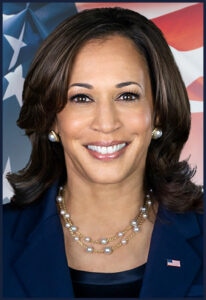
Kamala Harris (D)
Kamala Harris is the current vice president of the United States, serving under President Joe Biden since 2021. Her ascendancy as the Democratic Party’s presidential nominee came after Biden withdrew from the race in July.
Harris previously represented California in the U.S. Senate from 2017-21, and she was first elected to statewide office as California’s attorney general in 2010. As vice president, she has cast a record 33 tie-breaking votes in the Senate, including the deciding vote to send the Inflation Reduction Act of 2022 to Biden’s desk.
Harris was born in Oakland, California, and is the daughter of immigrant parents — her father immigrated from Jamaica, and her mother immigrated from India. She earned degrees from Howard University and the University of California Hastings College of Law and went on to pursue a career in law, first as an Alameda County prosecutor and later as the district attorney of San Francisco.
The vice president has campaigned on lowering costs and cutting taxes for working families and protecting access to abortions and birth control. More information on her policy positions is available on her campaign website.
If elected, Harris would become the first woman president and the first president of South Asian descent.
— Kyle Brown
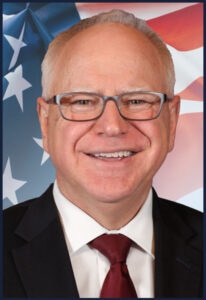
Tim Walz (D)
Tim Walz currently serves as the governor of Minnesota and was first elected to this position in 2018.
According to the Harris-Walz campaign website, Walz enlisted in the National Guard when he was 17 and served for 24 years. He was also a teacher for around 20 years, the website states.
Walz was additionally elected to the U.S. House of Representatives in Minnesota’s First Congressional District in 2006 and served until 2019.
As governor of Minnesota, Walz oversaw the state's COVID-19 response, using his emergency powers to sign controversial executive orders limiting capacity in restaurants and requiring masks in public places. He also faced criticism for his handling of the civil unrest that unfolded in the Twin Cities following the murder of George Floyd.
Since winning reelection in 2022, Walz signed bills legalizing recreational marijuana, codifying the right to an abortion, guaranteeing free breakfast and lunch for K-12 students, and establishing paid family and medical leave.
— Morgan Reddekopp
Donald Trump and JD Vance (R)
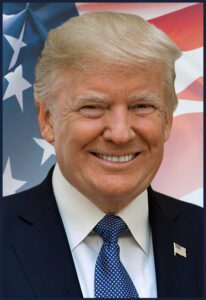
Donald Trump (R)
Donald Trump served as the 45th president of the United States from 2017-21. This is Trump’s third consecutive run as the Republican presidential nominee.
Despite losing the 2020 election, Trump has repeatedly claimed to have won. He has also denied accusations that he incited a crowd of supporters to storm the U.S. Capitol on Jan. 6, 2021, in a last-ditch attempt to stop the certification of the 2020 election.
The Trump administration took a hardline approach to immigration and foreign trade, erecting hundreds of miles of walls along the southern border with Mexico, replacing NAFTA with the U.S.-Mexico-Canada Agreement and imposing tariffs on billions of dollars’ worth of Chinese imports.
President Trump also signed the first major overhaul of the U.S. tax code in decades, the Tax Cuts and Jobs Act. The law permanently cut the corporate tax rate and greatly raised the standard deduction for individuals while capping deductions for state and local income tax.
Perhaps his most lasting impact, Trump reshaped the federal judiciary, confirming more than 200 federal judges, 54 appeals judges and three Supreme Court justices to solidify a 6-3 conservative majority.
The coronavirus pandemic dominated the final year of Trump’s term. He discouraged mask mandates and lockdowns but cleared the way for the expedited development of two FDA-approved COVID-19 vaccines.
Trump is the only president to be impeached twice. This year, a New York jury convicted him on 34 felony charges for falsifying business records. Sentencing in that case has been delayed until after the election; three other felony indictments are pending.
A native of Queens, New York, Trump rose to prominence as a luxury real estate mogul and gained further fame through his book, “The Art of the Deal,” and his reality TV show, “The Apprentice.” He is a graduate of the Wharton School of Finance and Commerce at the University of Pennsylvania.
If elected, Trump would join Grover Cleveland as the second president to serve two nonconsecutive terms. Read more about his policy platform on his campaign website.
— Kyle Brown
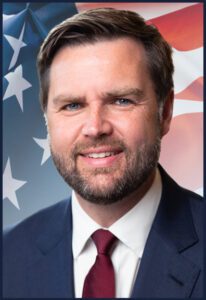
JD Vance (R)
Ohioans first elected JD Vance to the U.S. Senate in 2022. His seat was previously held by Republican Rob Portman, who retired, the Associated Press reports.
Vance enlisted in the Marine Corps around 2005 and served in Iraq. He completed his undergraduate studies at Ohio State University and went on to graduate from Yale Law School. He also worked as a venture capitalist in Silicon Valley.
He also wrote “Hillbilly Elegy,” a memoir about his upbringing in Middletown, Ohio, which was made into a Netflix movie.
While he was a “never Trump” Republican in 2016, he reversed his opinion by the time Trump endorsed him in 2021.
AP also reports Vance sometimes embraces bipartisanship, like when he co-sponsored a railway safety bill following the train derailment in the small Ohio town of East Palestine. He also sponsored legislation to extend and increase funding for Great Lakes restoration and has supported bipartisan legislation to boost workers and families.
— Morgan Reddekopp
Click here to view the results of this race when polls close.
U.S. Senate - Minnesota
Amy Klobuchar (D)(i)
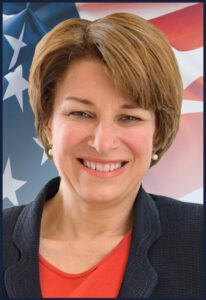
Amy Klobuchar (D)
Amy Klobuchar is the first woman elected to represent Minnesota in the U.S. Senate. Her father was a newspaperman and her mother was an elementary school teacher. Klobuchar was the valedictorian of her Wayzata High School class and graduated from Yale University and the University of Chicago Law School.
Before winning election to the Senate in 2006, Klobuchar headed the Hennepin County Attorney's Office — the largest prosecutor's office in Minnesota — for eight years. In her time in the Senate, Klobuchar passed legislation to end human trafficking and combat the fentanyl and overdose crises. Klobuchar serves as the chairwoman on the Judiciary Subcommittee on Competition Policy, Antitrust and Consumer Rights. She is also the chairwoman of the Senate Rules Committee.
Klobuchar is seeking her fourth term as Senator, which would be a first for a Minnesotan.
Royce White (R)
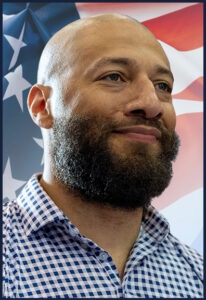
Royce White (R)
Royce White, a native of St. Paul's Rondo neighborhood, was named Minnesota Mr. Basketball in 2009. He saw success in his only season at Iowa State University and was selected 16th overall by the Houston Rockets in the 2012 NBA Draft. He made headlines for battling the NBA over the Collective Bargaining Agreement and, in particular, its lack of a comprehensive mental health policy.
White eventually transitioned into politics and in 2022, tried to challenge Ilhan Omar for the 5th Congressional District seat but failed to win the Republican primary. Earlier this year, White won the GOP endorsement at the state convention and defeated Joe Fraser to secure the Republican Senate nomination. On White’s website, he states that his top three priorities are "the border, debt, and forever wars."
— Cory Knudsen
Click here to view the results of this race when polls close.
U.S. Senate - Wisconsin
Tammy Baldwin (D)(i):
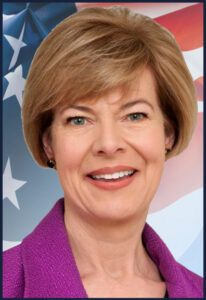
Tammy Baldwin (D)
The 62-year-old native Wisconsinite announced her campaign for a third term in the U.S. Senate in April 2023. She was first elected to the position on Nov. 6, 2012. Before that, she served in the U.S. House of Representatives from 1999-2013, becoming the state’s first woman elected to Congress and the country’s first openly gay challenger sent to Congress, according to her campaign website.
Baldwin's campaign website shows she supported the Infrastructure Investment and Jobs Act and helped pass both the Inflation Reduction Act and the PACT Act. She also wrote the Women’s Health Protection Act after Roe v. Wade was struck down. Baldwin also introduced the Dairy Pride Act, which would require the FDA to enforce its own standards of identity for dairy products by barring plant-based alternatives from using labels such as milk, cheese and yogurt.
She has also been among other regional lawmakers to ask the U.S. Department of Transportation for funding in the replacement of the Blatnik Bridge, which connects the cities of Superior, Wisconsin and Duluth, Minnesota.
Previously, Baldwin voted in favor of the Kids Online Safety and Privacy Act, the Securing Growth and Robust Leadership in American Aviation Act, and the Reforming Intelligence and Securing America Act. Records show she voted against a bill that would reduce funding by 15% except for certain departments, such as the Defense and Veterans Affairs.
Eric Hovde (R)
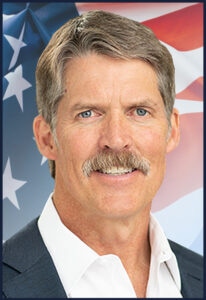
Eric Hovde (R)
Hovde, 60, previously ran for U.S. Senate in 2012, is the CEO of Hovde Properties, a real estate development firm and a bank holding company. He also established the Hovde Foundation with his brother in 1998, which at first focused on ending multiple sclerosis, a disease Hovde was diagnosed with when he was 27, according to his campaign website.
Hovde announced his campaign in late February, saying the country is facing economic, health care, crime, and border challenges. According to his campaign website, he feels the American dream is “slipping away” and is becoming “further and further out of reach for too many of my fellow citizens.”
Hovde claims the Affordable Care Act has failed to live up to its expectation of providing affordable care for all and says there as been a sharp increase in insurance premiums. Meanwhile, Hovde also says with the southern border remaining unsecured, drugs have flowed into the country from both Mexico and China and created a humanitarian crisis. He also says the current border policy has “empowered the cartels, subsequently increasing the flow of drugs, including highly fatal drugs like fentanyl.”
On the economy, Hovde’s website says that “it is imperative that we start to change course and dramatically reduce our country’s federal spending and deficits.” The site also shows graphs displaying gross federal interest on Treasury debt and the amount of debt compiled since the end of the 2020 fiscal year, with a national debt clock. More information about his stances can be found here.
— Krystal Frasier
Click here to view the results of this race when polls close.
U.S. House: MN-1
Brad Finstad (R)(i)
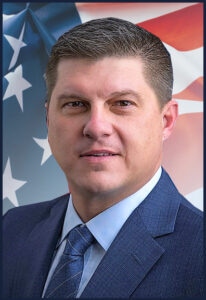
Brad Finstad (R)
In Minnesota’s southernmost district, Republican Brad Finstad is looking to win a second full term in the U.S. House. Finstad has held the seat since 2022, first being selected in a special election to finish fellow Republican Jim Hagedorn’s term, after the congressman died. Finstad then won the 2022 general election, holding the position through one term.
A fourth-generation Minnesotan, Finstad grew up on a family farm in Brown County. Before serving as a congressman, Finstad was the Minnesota director for USDA Rural Development from 2017 until 2021.
Finstad’s platform includes strengthening veterans’ services, promoting rural manufacturing, protecting individual freedoms, promote agriculture and is pro-coal, oil, gas and nuclear power. More on Finstad’s campaign and other platform policies can be found on his campaign website.
Rachel Bohman (D)
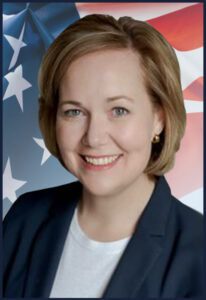
Rachel Bohman (D)
Democrat Rachel Bohman is hoping to be the first Democrat to win in Minnesota's 1st Congressional District since 2016, when Gov. Tim Walz was elected to his fifth and final term as a U.S. Representative.
Bohman grew up in Rochester, a daughter to a single mother, and put herself through law school. Bohman later served as the head of election for Hennepin County before returning to Rochester. There she was elected to the Rochester Township Board, later serving as an assistant county attorney.
Part of Bohman’s platform aims to lower the cost of essential goods, advocate for farmers, protect reproductive rights, bring more support to local business and lower health care costs. More on her policies and campaign priorities can be found on her campaign website.
— Ryan Pattee
Click here to view the results of this race when polls close.
U.S. House: MN-2
Angie Craig (D)(i)
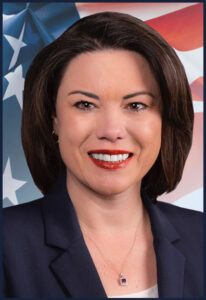
Angie Craig (D)
Angie Craig has served as the U.S. Representative for Minnesota's 2nd Congressional District since 2019. Craig started her career as a newspaper reporter before working in business for more than 20 years. Some of the issues she focuses on include creating more accessibility to college and health care, in addition to protecting reproductive rights and supporting law enforcement. Since coming to Congress, Craig wrote and passed a bill capping out-of-pocket insulin costs for seniors on Medicare at $35.
Craig has previously been ranked in the top 2% of all bipartisan members of Congress, as evidenced, in part, by past legislation she wrote being signed into law by Democratic and Republican presidents, according to her campaign website.
Craig and her wife, Cheryl, have four sons, the oldest of whom is a trade school graduate and the youngest a junior in college.
Joe Teirab (R)
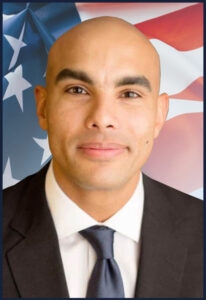
Joe Teirab (R)
Joe Teirab is a formal federal prosecutor and a U.S. Marine Corps veteran. He grew up in a small town in southwest Minnesota and currently resides in Burnsville. Teirab, a Cornell University and Harvard Law School graduate, announced his campaign for Minnesota's 2nd Congressional District in October 2023.
Some of the issues Teirab is focusing on include reducing the cost of living, securing the border, improving public safety by supporting law enforcement and standing up for veterans.
— Emily Baude
You can hear directly from the candidates, who sat down with 5 EYEWITNESS NEWS a week before the election.
Click here to view the results of this race when polls close.
U.S. House: MN-3
Tad Jude (R)
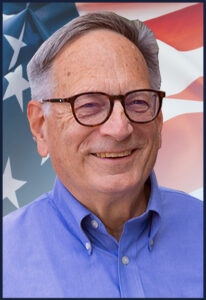
Tade Jude (R)
Republican candidate Tad Jude born and raised in Maple Lake. He is married, a father of three and has a blended family of nine. He has had worked in politics and public service for much of his career while also being a small business owner. Jude graduated from the University of St. Thomas and earned his law degree from the William Mitchell School of Law in 1977.
In 1972, at 20 years old, Jude became the youngest person ever elected to the Minnesota Legislature. At that time, he was part of the DFL Party and remained a Democrat the entire time he was a state representative (1973-1982) and state senator (1983-1988). He switched parties in 1992.
He’s also been a Hennepin County commissioner and Minnesota District Court judge in the 10th Judicial District.
Jude is currently a commander at American Legion Post 303 and member of a number of nonprofit boards.
Jude’s platform includes combating inflation, updating the immigration system and securing the borders, eliminating taxes on people receiving Social Security benefits, and increasing penalties for people who hurt law enforcement officials. You can learn about his stance on these and more issues on his campaign website.
Kelly Morrison (D)
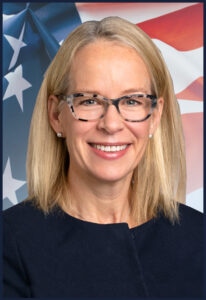
Kelly Morrison (D)
Democratic candidate Kelly Morrison is an OB-GYN doctor who first ran for office in 2018, winning election to the Minnesota House of Representatives. She won reelection in 2020. In 2022 she ran for and won a seat in the Minnesota Senate. She resigned from her seat on June 6 to run for the 3rd Congressional District seat left vacant by Democratic Rep. Dean Phillips.
Morrison’s family has lived in Minnesota for generations. She and her husband live in Deephaven with their three children and two dogs. She got her undergraduate degree at Yale University and went to medical school at Case Western Reserve University.
Morrison’s platform includes lowering the cost of health care, protecting reproductive rights for women and investing in education for students. You can learn about can learn more her stance on these issues and more on her campaign website.
— Ashley Halbach
You can hear directly from the candidates, who sat down with 5 EYEWITNESS NEWS a week before the election.
Click here to view the results of this race when polls close.
U.S. House: MN-4
Betty McCollum (D)(i)
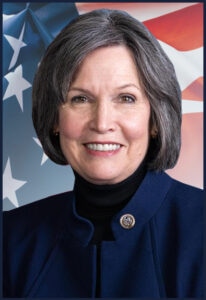
Betty McCollum (D)
Incumbent DFL Rep. Betty McCollum first won election to represent Minnesota’s 4th Congressional District in 2000. Her 12 terms make her the longest-tenured member of Minnesota’s current delegation in Washington.
McCollum was born in Minneapolis and graduated from St. Catherine University in St. Paul. Her career in public office began when she was elected to the North St. Paul City Council in 1986. She won election to the Minnesota House of Representatives in 1992, serving four terms before being elected to Congress.
According to her campaign website, McCollum includes preserving Social Security, Medicare and Medicaid among her top priorities in Congress. Access to affordable health care and maintaining the Affordable Care Act is also a top issue for her.
May Lor Xiong (R)
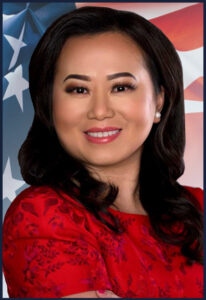
May Lor Xiong (R)
May Lor Xiong is the Republican nominee for the 4th Congressional District. She was born in a refugee camp in Ban Vinai, Thailand, and immigrated to the United States with her family when she was 8 years old.
Xiong holds a master’s degree in education and taught English as a second language at St. Paul Public Schools for 20 years before becoming a real estate broker.
Her campaign is focused on increasing public safety, curbing inflation, securing the U.S.-Mexico border and advocating for school choice. She previously challenged McCollum in 2022 and lost by a wide margin in the heavily Democratic district.
— Kyle Brown
Click here to view the results of this race when polls close.
U.S. House: MN-5
Ilhan Omar (D)(i)
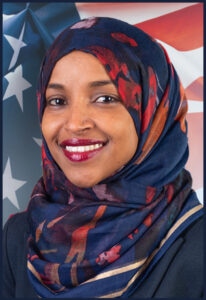
Ilhan Omar (D)
Ilhan Omar is seeking her fourth term in the U.S. House of Representatives, first winning election in Minnesota's 5th Congressional District in 2018. She was the first African refugee to become a member of Congress, the first woman of color to represent Minnesota and one of the first two Muslim women to be elected to Congress.
Omar and her family fled civil war in Somalia when she was 8 and spent four years in a refugee camp in Kenya before moving to the U.S.
Before running for office, Omar worked as a community educator for the University of Minnesota, was a policy fellow at the Humphrey School of Public Affairs and served as a senior policy aide for the Minneapolis City Council.
Dalia al-Aqidi (R)
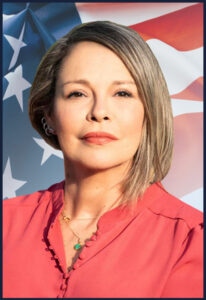
Dalia Al-Aqidi (R)
According to the bio on her campaign website, Dalia al-Aqidi was born in Iraq and obtained permanent residency in the U.S. in the 1990s after fleeing the country due to Saddam Hussein’s violence against his own people.
She launched her career in journalism while living in United Arab Emirates. He has worked as an anchor for Al-Hurra TV, the U.S. government-owned Arabic channel that broadcast into the Middle East and North Africa. She has written, produced and hosted live shows on TV and radio in English and Arabic, leading her to interview several world leaders.
— Morgan Reddekopp
Click here to view the results of this race when polls close.
U.S. House: MN-6
Tom Emmer (R)(i)
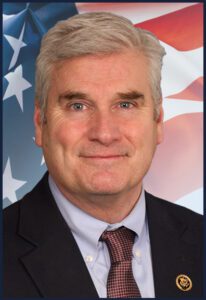
Tom Emmer (R)
Tom Emmer was born in Minnesota in 1961 and attended St. Thomas Academy. He earned his bachelor's degree from the University of Alaska-Fairbanks and later graduated from the William Mitchell College of Law.
After practicing law for several years, he opened his own law firm and served on the city councils in Independence and Delano. Before coming to Congress, he served in the Minnesota House of Representatives from 2004-08. Emmer was sworn in for his first term in the U.S. House of Representatives on Jan. 6, 2015, and is currently serving his fifth term.
After serving as the chairman of the National Republican Congressional Committee, Emmer was elected by his fellow Republican colleagues to be the House majority whip. He also currently sits on the House Financial Services Committee.
Jeanne Hendricks (D)
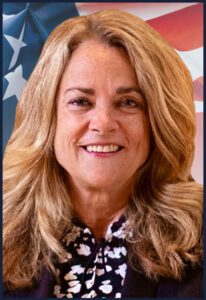
Jeanne Hendricks (D)
Jeanne Hendricks was born in Canton, South Dakota, in 1957. Her mother was a secretary in a law office and her father was a high school science teacher and later became an investment broker.
Hendricks attended Augustana University and, in 1979, received a Bachelor of Arts degree with a nursing major. In 1993, Henricks graduated from Winona State University with a master of science degree in nurse anesthesia.
Hendricks is a certified nurse anesthetist and has worked in anesthesia for the last 30 years. During her career, she built coalitions and acted as a spokesperson to represent her coworkers in the areas of benefits, salary, credentialing requirements and administration issues.
— Cory Knudsen
Click here to view the results of this race when polls close.
U.S. House: MN-7
Michelle Fischbach (R)(i)
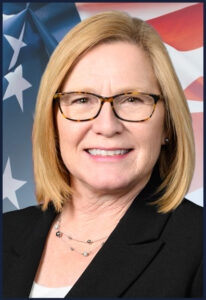
Michelle Fischbach (R)
Michelle Fischbach, 58, is running for a third term representing for Minnesota’s 7th District, first winning election in 2020. Prior to that, she served in the Minnesota Senate after winning a special election 1996. In 2018, she was elevated from president of the Senate to lieutenant governor, following the line of succession to replace Tina Smith after then-Gov. Mark Dayton appointed Smith to fill Al Franken's vacant seat in the U.S. Senate.
According to her campaign website, Fischbach cites protecting the agricultural sector, Second Amendment Rights, and unborn babies among her top priorities.
As a member of the House, Fischbach also serves on multiple committees: Ways and Means, Budget, Ethics and Rules. She also serves on subcommittees for Trade and Oversight. She has introduced more than three dozen pieces of legislation, of which 11 have passed one chamber of Congress. Those pieces of legislation include the Supporting Pregnant and Parenting Women and Families Act and a bill regarding revisions in the United States Code. Fischbach’s sponsored legislation which later became law include the renaming of three U.S. Post Offices in Minnesota.
AJ Peters (D)
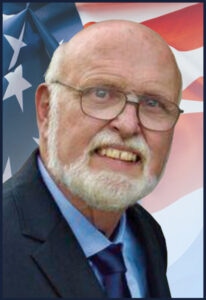
AJ Peters (D)
Alvin John (AJ) Peters, 76, is challenging Fischbach to the 7th Congressional District in Minnesota. Peters, who was born in Iowa, has lived in the Browerville area for 30 years, according to his campaign website. However, the site adds that for two years, he spent weekdays in the Twin Cities area for treatment of a medical issue before driving home for the weekend. He’s a member of the Todd County DFL Board, is the chair of the Hands of Hope Resource Center, as well as the chair of the Todd County Broadband Coalition and the Long Prairie Chamber of Commerce.
Peters says he wants to find solutions for rural healthcare, land stewardship, livable wages, as well as the impact farmers feel after potentially losing their family farms. One of the pages on his website states he will push for polices that put family farmers over large corporations, including the enforcement of antitrust laws to prevent monopolies and advocating for reforms to crop insurance programs. His priorities are listed as health care, protecting women’s health care, improving infrastructure for roads and internet, making workforce and senior housing more affordable, immigration, Social Security as well as increasing funding for public schools.
Peters also has strong opinions regarding care for senior citizens. His campaign website includes pages for his proposals for fighting age discrimination, keeping seniors in their homes, mental health care for seniors, as well as Medicare and Medicaid.
— Krystal Frasier
Click here to view the results of this race when polls close.
U.S. House: MN-8
Pete Stauber (R)(i)
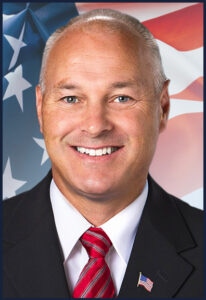
Pete Stauber (R)
Incumbent Republican U.S. Rep. Pete Stauber is already well known to many Minnesotans. Growing up in Duluth with five brothers, Stauber was part of the 1988 national champion Lake Superior State University hockey team and later played in the NHL for the Detroit Red Wings. After retiring from the game in 1993, Stauber served more than two decades in law enforcement in Duluth and served as the President of the Law Enforcement Labor Services Union, Local 363.
In 2018 Stauber became the first Republican since Chip Cravaack in 2010 to win the 8th Congressional District seat. He has held the position since then and is now seeking a fourth term.
Stauber platform includes reducing inflation and the cost of living, strengthening security at the United States' border with Mexico, strengthening America's energy and mining industries, opposing abortion and protecting gun rights. More on Stauber’s life and policies can be found on his campaign website.
Jen Schultz (D)
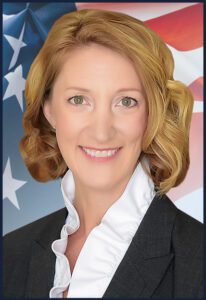
Jen Schultz (D)
Democratic candidate Jen Schultz is again challenging Stauber for the 8th Congressional District seat, falling short in 2022 with 42.7% of the vote. Schultz grew up in Duluth and has called the city her home for 20 years. Schultz, who holds a Ph.D in health economics, has worked as an economist, educator and union member at the University of Minnesota-Duluth.
Schultz later served eight years representing Duluth in the Minnesota Legislature, where she served on a number of committees including as chair of the House Human Services Finance and Policy Committee. She was also vice chair of the Council of State Government Great Lakes Legislative Caucus Executive Board.
Schultz’s platform looks to safeguard Social Security, address global warming, increase federal funding for local schools, protecting reproductive freedom and investing in job creation for the United States. Additional policies and more information for Schultz’s campaign can be found on her campaign website.
— Ryan Pattee
Click here to view the results of this race when polls close.
U.S. House: WI-3
Derrick Van Orden (R)(i)
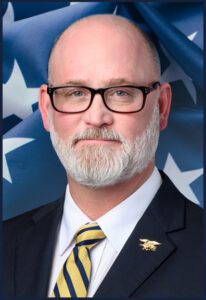
Derrick Van Orden
Republican incumbent Derrick Van Orden has represented Wisconsin's 3rd Congressional District since 2023. Van Orden joined the Navy at 18 and served for 26 years before retiring as a Navy SEAL senior chief with five separate combat deployments.
Van Orden went on to write a book — "A Book of Man: A Navy SEAL’s Guide to the Lost Art of Manhood" — and consult with Fortune 500 companies before retiring to a farm with his wife, Sara. However, Van Orden later came out of retirement to attend law school and run for Congress.
Some of the issues Van Orden is focusing his campaign on are education for children, rebuilding the economy, veterans issues, improving health care and border security. He also supports term limits for members of Congress.
Rebecca Cooke (D)
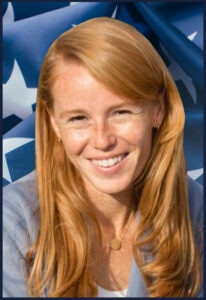
Rebecca Cooke
Rebecca Cooke was born and raised on a dairy farm in Eau Claire and graduated from the University of St. Thomas in St. Paul. Before her campaign for Wisconsin's 3rd Congressional District, she owned a small retail business and founded a nonprofit called Red Letter Grant, which works to promote women in business. Later, Cooke was appointed to the Wisconsin Economic Development Corporation by Gov. Tony Evers.
Some of the issues Cooke’s campaign is focusing on include healing the health care system, creating a better economy for working families, fighting for Wisconsin farmers, empowering unions, and ensuring seniors age with dignity. Cooke has been endorsed by several unions, including OPEIU, LiUNA Local 464, and SEIU Wisconsin.
— Emily Baude
Click here to view the results of this race when polls close.
U.S. House: WI-7
Tom Tiffany (R)(i)
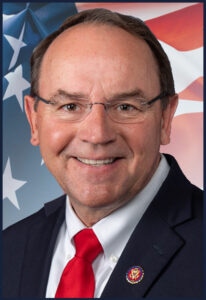
Tom Tiffany (R)
Republican incumbent Rep. Tom Tiffany was elected to the seat in May 2020 in a special election. Tiffany had previously served in the Wisconsin State Assembly — first elected in 2010 — and then the Wisconsin Senate.
He and his wife owned and Wilderness Cruises in Wisconsin for 20 years. Tiffany also was a damtender for 29 years on the Will Flowage in Rice Lake, Wisconsin.
Tiffany grew up in the 7th Congressional District on a dairy farm near Elmwood. He graduated from University of Wisconsin-River Falls.
A few of the issues on Tiffany’s platform include securing the border, not allowing tax dollars to fund abortions and defending gun rights. You can learn more about these stances and other platform issues on his campaign website.
Kyle Kilbourn (D)
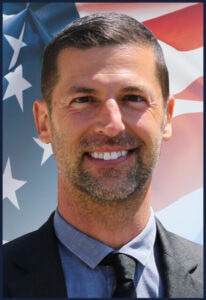
Kyle Kilbourn (D)
Democratic challenger Kyle Kilbourn grew up in a very small town in North Dakota and graduated with an undergraduate degree from the University of Minnesota and earned a doctorate in product design and innovation from the University of Southern Denmark.
Kilbourn and his husband live in the Northwoods of Wisconsin, where his husband grew up. Kilbourn's career has included working in design, teaching college students, and researching at Medtronic.
Some of Kilbourn’s platform includes protecting Social Security and Medicare, combating climate change, and making health care more affordable. You can read more these issues and more on his campaign website.
— Ashley Halbach
Click here to view the results of this race when polls close.

